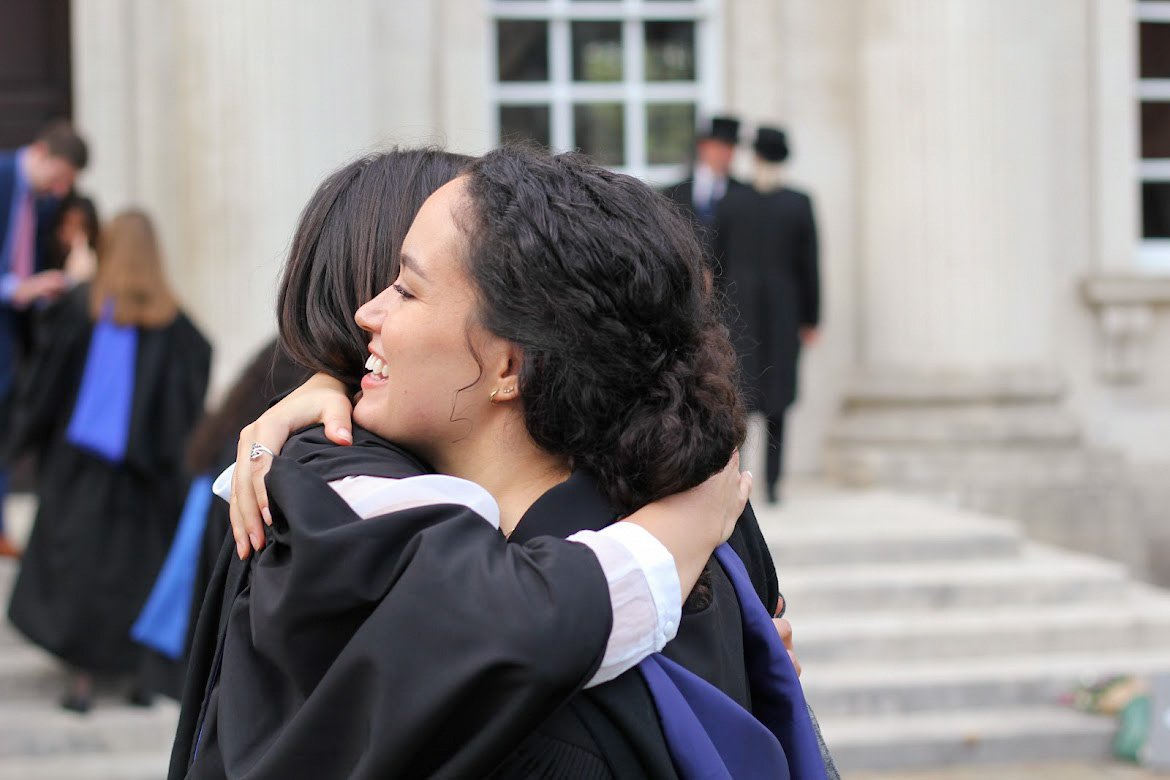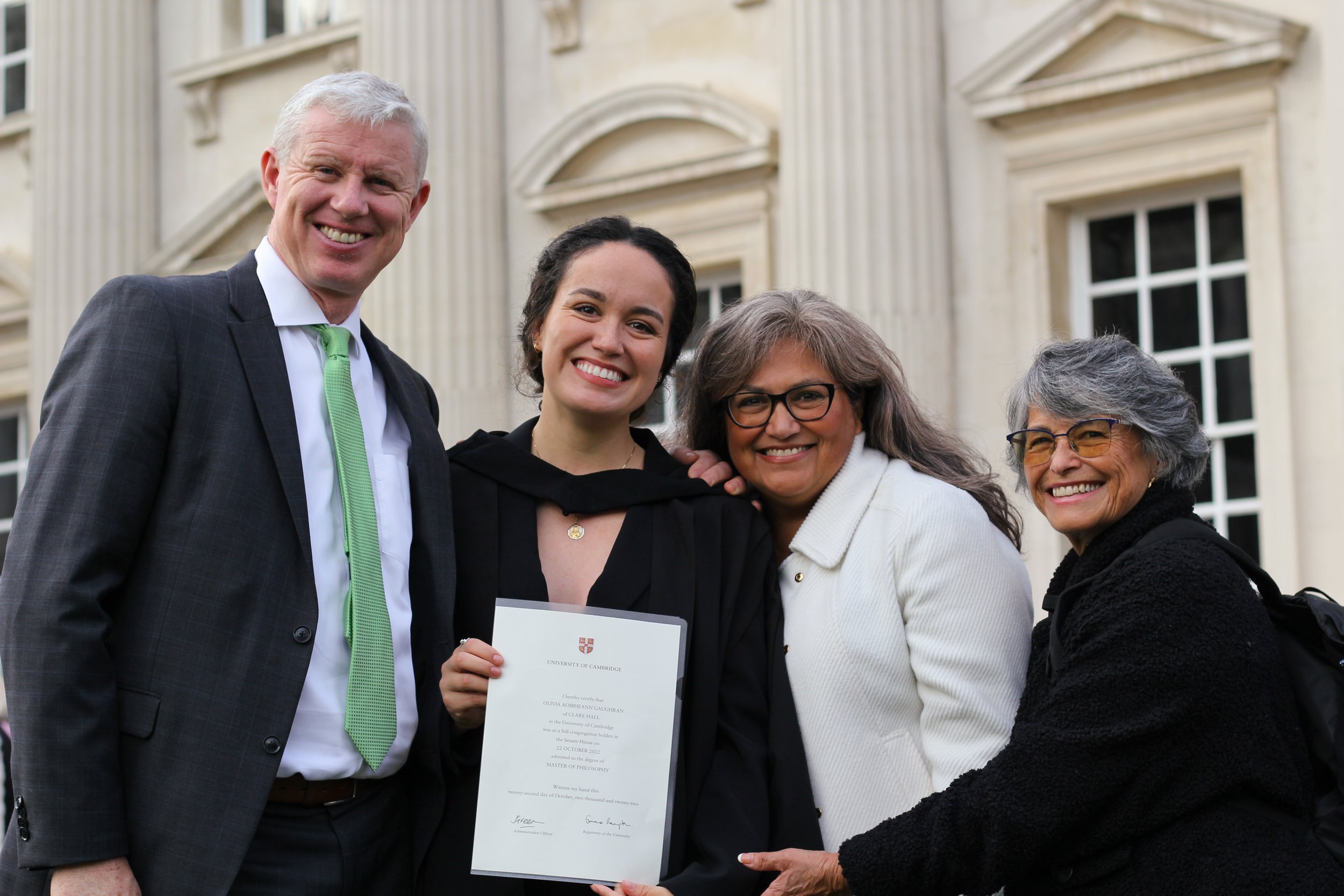A Very Cambridge Graduation
I just bought my flight home to Seattle for Christmas. It’s a one-way ticket.
My chest feels damp, dark, and green, like a thick layer of forest moss has grown over my lungs. December 22nd is going to be a difficult day. It is already a difficult day today.
When I was on my computer the other day, I found a document on my desktop simply titled, “Thoughts”, last modified on November 1st, 2021. I couldn't remember writing it, so I opened it, curious. I felt my body grow warm and then cold with familiarity as I read each line.
It is a short document, just two unedited paragraphs on a single page:
People don’t understand me here. I feel like I’m bleeding out all the dark and beautiful parts of me in my classroom, all over my cohort, into the room where no one knows what to do with it and I am just the emotional American girl who didn’t get the memo that anthropology is supposed to just be anthropology. Ethnography isn’t meant to make you cry, research isn’t supposed to bring you deep down into the grave, this material shouldn’t be this difficult to discuss, to synthesize, to bring into the material world. It’s not that I don’t understand it; I do. What I don’t understand is how we are meant to make something out of the ether, to make distinct cuts in the fabric of the universe and make a claim about how life works on this quilt square. How are we to bound a moment into borders and study it? We are meant to make material out of something immaterial. I feel like I’m too watery and too much for these rooms, like a star that has burnt out and all my light and gas and heat is flooding out from me in all directions, and how did I think that coming here would make me whole again? I thought I was ready to understand the world. I thought anthropology would be the road that brought me there. I am just realizing: I can barely understand myself. How am I going to do this?
I am learning quite quickly that now, when my relationship with exercise is humming happily, when the pandemic’s gut-wrenching grip on me is less and less oppressive, when I’m learning in an intellectual epicenter of the world – my internal resistance towards representing other people’s experiences still gnaws away at my throat. I am so quiet here, because when I speak, I pour myself all over the floor. I thought I wanted to bring my whole self into my research but seeing the way people look at me makes me conscious of my entire body, how I am heard, who I am – how I don’t fit in here. I don’t fit in anthropology. I think I came here because I knew this place had something to teach me. But if I’m honest, I got on the flight here not because I felt this program was a perfect fit, but because I knew something awaited me on this side of the door – but I didn’t know what. I still don’t know what. Now I’m here, I’m in the other room, and it’s all shadows. I don’t know when the light will flicker on. I wander, lost and too much and lonely and aching for something familiar, to be held, to feel understood, to light up, to feel like myself. But my department teaches so rigidly. I suppose they teach us this way so that we may one day say something expertly about someone else. But I think I needed to know myself more deeply before walking through this dark doorway, because these rooms are not designed for me.
Where am I?
I felt like that for three months. Indeed, maybe you remember the article I published about my crisis in anthropology during this time. From September to December last year, I was alone (by choice), struggling (by consequence), and insecure (by nature). I did not originally plan to go back to Seattle for the holidays, but a week before Christmas, I knew I needed to retreat somewhere familiar and warm, to recover in my home where I would be fed, rubbed, and allowed to unravel. I suppose those two paragraphs show why this was necessary. I was asking impossible questions: How am I going to do this? Where am I? Who am I?
It’s hard to bring myself back into the memories of those days, not least because I returned to Cambridge in January and threw myself into the mystery again. Something took hold that hadn’t before. I’m not sure what. But in the freezing blue light of the early January mornings, I would put on my headphones and run for four or five miles in the meadows near my house, re-introducing my body to the world where I lived. It was as if I was shaking the hand of the city, saying hello to a place which I desperately wanted to love. I made peace in some way with being ‘too much’ and just let myself leak all over the place. And as I watered the places I walked, I noticed life springing up all around my feet.
I believe it is impossible not to love someone if you know them intimately enough. When a person stands in front of me, expression measured and calm, fingers clasped gently in front of their belly, looking at me as though they could wait forever to hear me speak first, I could die with how much I love them in that moment. I am startled into seeing right into the center of them. To me, that is undiluted, bare love. I believe the same about places. I grew comfortable meeting England’s gaze as she stood there, waiting for me to speak first. She shone through my windows every morning and ruffled my hair until I woke up, sleepy and grateful that we had another day to say hello, another day to make together.
That is how I felt about Cambridge in the spring. I was no longer a stranger or an awkward side character in the story of this place. We were familiar enough to love each other. This deepened as I started traveling to London for my fieldwork in April, where I spent my days reading and writing about forgiveness. There was something in that work which broke me open and saved me. I cried on every train ride back to Cambridge. I cycled home each night with legs of lead, willing my bicycle home with eyes half closed. My dreams were full of angry, tearful, grieving people who tapped my shoulders and asked me to please pay attention to them, asked me, are you listening? I was overwhelmed in the mornings and exhausted in the evenings. I saved my mind by meeting England in the meadows in the evenings with a cup of tea, where I watched the sun sink over the vast fields of lettuce and wheat, and sent all of that overwhelm straight into her fertile ground. I wrote on the weekends and cooked dinner with my friends, played soccer games on Sundays. It wasn’t necessarily “easier” than it was in November. But it was more rhythmic, as though the white noise of fear had dropped out and I could hear the pulse of my life clearly. I didn’t feel out of place. I suppose it may be quite simple: I grew used to life here.
I graduated last weekend. My parents and grandmother came out to see me and celebrate this accomplishment together. We went to Paris for a weekend, where I had the time of my life trying to speak French, of which I knew very little. Every Parisian was so kind to us; it reminded me of how lovely it is to be vulnerable in a new place and to trust a stranger to understand you, even without words. We walked, talked, and ate together in nearly all of the arrondissements. Then we returned to England on the chunnel, and I showed my grandma around Cambridge - a city which I would have never discovered without her faith. Without my mother’s understanding. Without my father’s all-in attitude. The graduation ceremony was held in the Senate House, a neo-classical building from the 1720’s where all Cambridge graduations are now held.
In the Senate House, graduations proceed something like this: all graduands line up in rows of four (by college). We wear long black robes and hoods, and must adhere to a very strict dress code. Every hood is lined with colored silk, the color of which each represents a different type of degree. Each person in the row takes a finger of the hand of the Praelector of their college, who presents them (in Latin) for the degree they are about to receive. Each graduand is then called forward by name, where they kneel on a lush red cushion and present their clasped hands to an important individual on a small throne who is adorned in bright red robes lined with spotted fur. There is silly cap-tipping, loud proclamations, and a general air of austerity which fills the room quietly, like wispy cotton.
One young man in my row shares with me beforehand that he is graduating with his second masters degree in political science and was recently appointed the deputy mayor of a city in the Netherlands. Another tells me all about his free time spent ‘navigational rallying’ (a niche motorsport which combines precision of location with calculated speed) and his degree in nuclear engineering. These are the kinds of incredible people you meet here! We all stand nervously outside the Senate House, awaiting the signal to enter. When it is our turn, each in my row grasp a finger of our Praelector, Lucia, who smiles at us warmly as she presents us for our degrees. I kneel on the cushion, offer my hands to the woman in the fancy red robes, bow my head somberly, and emerge from the Senate House with a grin on my face. The whole thing is lovely and strange, and I wouldn’t have changed a thing.
When I re-read that journal entry from November 2021, I am struck with how different I feel about the whole experience now, only a year later. The taste left in my mouth is not one of confusion or non-belonging. I understand and love my subject. I am more comfortable in these spaces. And, perhaps the best part of all, I was able to introduce my family to some of the wonderful friends I have made here. Their overlap was so joyful to me. It felt as though I was hallucinating - the two groups of people who supported me through the year, together! My family adored each of them, and we talked about each afterwards at great length - finally, faces to names and stories which slot into place. I am simply grateful. That’s all. I am so grateful. This is what will break my heart when I get on that plane in seven weeks. No, England isn’t going anywhere. But this experience, this particular one, will draw to a bittersweet close. I will be leaving it behind soon.
I am so lucky. It is easy to take for granted how lucky I am, with all of this goodness around. So, although I have bought my plane ticket which will take me away from here for a while, I will always feel like the luckiest girl to have introduced myself to England. Lucky to have fallen in love with her, to have called her home.
I will be dreaming about these days for the rest of my life.


